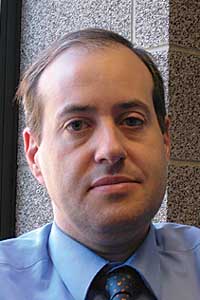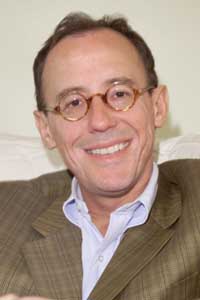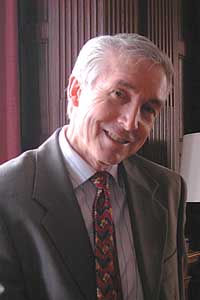Guggenheims go to three on faculty
By William Harms and Seth SandersNews Office
 Carles Boix | |
 Mark Lilla | |
 Robert Richards | |
Three University faculty members have received 2004 Guggenheim fellowships in the 80th annual U.S. and Canadian competition sponsored by the John Simon Guggenheim Memorial Foundation.
The foundation grants funding to fellows based on “distinguished achievement in the past and exceptional promise for future accomplishment.” The 2004 Guggenheim fellows from the University are Carles Boix, Associate Professor in Political Science; Mark Lilla, Professor in the Committee on Social Thought and the College; and Robert Richards, Professor in History, Philosophy, Psychology and the College.
This year’s fellowship winners, announced by Guggenheim Foundation president Edward Hirsch, include 185 artists, scholars and scientists selected from more than 3,200 applicants for awards totaling $6,912,000.
Decisions are based on recommendations from hundreds of expert advisers and are approved by the foundation’s board of trustees, which includes eight members who are past fellows of the Guggenheim Foundation—Hirsch, Joel Conarroe, Joyce Carol Oates, Richard Rifkind, Charles Ryskamp, Wendy Wasserstein and Ellen Taaffe Zwilich.
Carles Boix, Associate Professor in Political Science, whose research includes comparative political economy and comparative politics, has received a 2004 John Simon Guggenheim Memorial Foundation fellowship to study the emergence of party democracy in advanced countries between 1880 and 1930.
“I will study Western Europe and Australia and look at nations that were moving from restrictive democracy to full democracy, and see how parties mobilized electorates,” said Boix. “I also intend to look at how electoral rules affected outcomes.”
For his work, Boix will examine demographic information and records from individual electoral districts.
Although religion, income and social-economic status had an impact on party development, election rules also played a role. In countries that elect representatives by districts, such as the United Kingdom, two-party systems developed. In other countries, such as the Netherlands where representatives are allowed to be elected according to the proportion of votes a party received, many more political parties were organized.
Boix will spend the year completing research for a new book titled The Birth of Party Democracy.
Boix, who is co-director of the University’s Comparative Politics Workshop, also has written the books Political Parties, Growth and Equality (1998), which won the 1999 American Political Science Association award for the best book on political economy, and Democracy and Redistribution (2003).
In 1999, Boix received the Heinz Eulau award for the best article published in the American Political Science Review.
Boix has been a faculty member at Chicago since 1999 and previously taught on the faculty of Ohio State University.
He received a B.A. in law from the University of Barcelona in 1985; a B.A. in history from the University of Barcelona in 1986; an M.A. in public administration from the John F. Kennedy School of Government, Harvard University, in 1990; and a Ph.D. in political science from Harvard University in 1995.
Mark Lilla, Professor in the Committee on Social Thought and the College, has received a John Simon Guggenheim Memorial Foundation fellowship with which he plans to research and write a book titled The Stillborn God.
The book, Lilla said, “is about an episode in modern thought that has significant implications for the way we think about religion and politics. It concerns the attempt in 19th-century Germany to reform religion (Christian and Jewish) to make it compatible with modern life, and how that attempt failed, philosophically, theologically and politically. This failure has much to tell us about the legacy of the modern Enlightenment and the foundations of liberal democratic life.”
Lilla, who has long been concerned about the relationship between theology and politics, earned his Ph.D. from Harvard University’s department of government in 1990, with the thesis topic, “A Preface to Vico: Skepticism, Politics, Theodicy.”
He also holds an M.P.P. from the Harvard University Kennedy School of Government and a B.A. summa cum laude in political science and economics from the University of Michigan.
Lilla has written The Reckless Mind, Intellectuals in Politics and G.B. Vico: The Making of an Anti-Modern, and he has edited New French Thought: Political Philosophy and co-edited The Legacy of Isaiah Berlin. His articles include “Hegel and the Political Theology of Reconciliation,” “Multiculturalismo e ‘political correctness,’” “The Strange Birth of Liberal France,” “Kant’s Theological-Political Revolution,” and “The Trouble with Enlightenment.”
Before joining the Chicago faculty in 1999, Lilla taught at New York University.
He also has served as general editor for the New French Thought series from Princeton University Press and as editor of The Public Interest.
In 1995, he was made a Knight of the Order of Academic Palms by the French Ministry of Education, and in 1991, he received the Leo Strauss Award from the American Political Science Association for the best dissertation in political philosophy in the United States.
Lilla has received fellowships and grants from the Institute for Advanced Study, the Alexander von Humboldt Foundation, and the National Endowment for the Humanities, and he was awarded the Prix de Rome.
Robert Richards, an internationally respected authority on the history of science, has received a 2004 John Simon Guggenheim Memorial Foundation fellowship to study Ernst Haeckel and the battle over evolution in Germany.
Richards, Professor in History, Philosophy, Psychology and the College, will travel to Germany to study material and review other texts related to the work of Haeckel, a scientist who fueled a great debate between religion and science over the topic of evolution at the end of the 19th century and the beginning of the 20th century.
“I want to do an intellectual biography of Haeckel and also examine the discussions about evolution that Haeckel inspired,” said Richards.
Haeckel, who was a poet and painter as well as a scientist, did pathbreaking work on marine organisms. A turning point in his life came when, 18 months after he was married, his wife died.
“He became a broken man and abandoned religion at that point and turned to evolutionary theory as his religion,” Richards said. Much of the discussion in Germany over evolution can be traced to that experience in Haeckel’s life.
Haeckel wrote a number of fundamental works on evolution, including General Morphology of Organisms.
Richards, who also has received a grant from the National Science Foundation, intends to write a book on Haeckel with his Guggenheim fellowship. The book will be titled The Tragic Sense of Life: Ernest Haeckel and the Battle Over Evolution in Germany.
Richards, who is the Director of the Morris Fishbein Center for History, Science and Medicine, concentrates his research on the history and philosophy of biology. He is the author of numerous books, including The Romantic Conception of Life: Science and Philosophy in the Age of Goethe, published in 2002 by the University Press. In the book, he examines the history of science during that era by looking at the many connections between art, philosophy and science.
His other books include The Meaning of Evolution: the Morphological Construction and Ideological Reconstruction of Darwin’s Theory, published in 1992 by the University Press and translated into Spanish in 1998.
He also is the author of Darwin and the Emergence of Evolutionary Theories of Mind and Behavior, published in 1987. The History of Science Society awarded Richards for this book with its 1988 Pfizer Prize.
Richards came to Chicago as a graduate student in 1974, and he joined the faculty after receiving a Ph.D. in the History of Science from the University in 1978.
![[Chronicle]](/images/sidebar_header_oct06.gif)